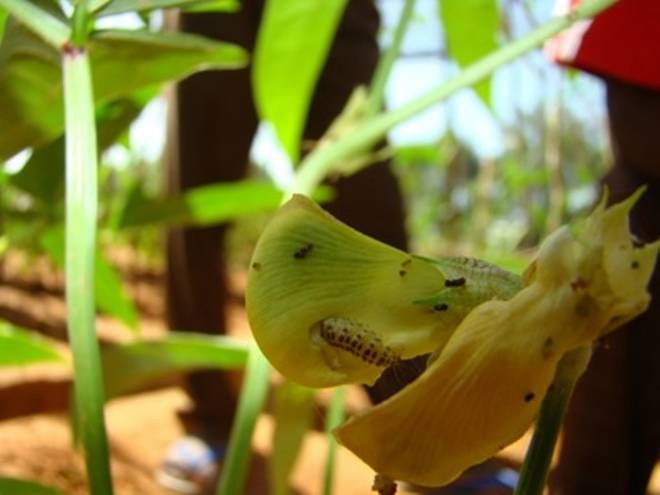Nana Danladi, 42, was married for 10 years to her husband, Bello, before he died. They had both farmed his plot of land growing cowpea.
The mother of four children, from Talata Marafa, Zamfara State, is one of many other women in the area known for their cowpea farming skills. But these skills are only exercised on their husbands’ farms or other people’s farms, on which they are hired to work and weather the storm of infestation by the pest, maruca.
A study in Wilpita North of Sri Lanka, led by Ranga Jayasinghe on Maruca vitrata infestation of Yard-long beans, says the pest is “recognised as one of the most serious legume pests.” The study also said, the maruca larvae feeds on flowers, stems, peduncles and pods of the beans and so “damage occurs at all developmental stages from seedling to podding stages.”
It also said, typical yield losses on cowpea due to maruca lead to serious losses at pod harvest and the consequent use of an array of agronomic management regimes such as application of conventional insecticides which cause adverse effects to the environment and human health, but fail to achieve satisfactory level of control.
As a result of these effects on their produce, the late Bello had explained to Nana, the need to use insecticide on their crops at least eight times in a farming season to prevent maruca from ravaging their beans.
She however, had to stop spraying the insecticide when she got pregnant with her fourth child and then permanently, when he died, as she lost both farm and crops to her in-laws after his burial rites.
Ayi Danladi is, the first of Idi’s three wives. She makes extra income selling bean cake in the evenings, from the discarded portions her bosses do away with after she and other women are done sieving through the good ones to be sold.
Although, the 50-year-old doesn’t understand the science behind farming and Agriculture, she knows that, “it is a nightmare when I plant beans and hardly have anything to show for it at harvest time due to maruca.”
She added that, this is not the only part of the suffering, “When I go to the market to buy good quality beans I need to make kosai, (bean cake) it is expensive. I then buy bad quality ones that are broken and or infested with insects. I wash off the insects and sun dry them, before I grind them.”
This common labour is the foundation upon which Nana and Ayi have built a friendship.
|
|
What making a ‘harvest’ means
Both women explained what it takes to get anything significant out of their harvest.
Ayi said, “It takes about an hour to thresh a bag of beans if it is dry. After threshing, we pick and if it’s for sale, it is measured out. What is left after this sorting is what we are paid with. Nana takes it home and I use mine for business. We use water to separate them and feed the animals the ‘bad’ ones.”
The women say they have never received cash for labour. “It is assumed that we know we should do it,” Nana said.
She also explained that, beans with holes differ significantly in price from full bodied ones. “The beans without holes are much more expensive.
“We buy a measure of beans for N500, if you bargain well. When I make kosai from it, I make an additional N200.”
|
|
A call to action
To alleviate the pressure and shortages farmers endure, the women appeal for more and better cowpea seedlings to be provided for their husbands and farm owners.
Against this backdrop, the African Agricultural Technology Foundation (AAFT) and the Institute for Agricultural Research (IAR), Zaria, have developed the maruca resistant cowpea to enhance production and output of the farmers.
The project funded by the United States Agency for International Development, (USAID), started in 2009 and is ongoing simultaneously in Nigeria in (Talata Mafara, Zamfara State, Minjibir, Kano State and Samaru, Kaduna State) as well as in Ghana, Burkina Faso and Malawi with the plant gene provided by the AATF.
Prof. Mohamed Ishiyaku, Principal Investigator, Pod-borer Resistant Cowpea Project, who spoke about the research, said it became important to develop an insect resistant cowpea as farmers suffer up to 80 per cent yield loss caused by maruca.
He said, “The improved maruca resistant cowpea can produce 1.6 tons per hectare against the current 600kg per hectare and can be cultivated all year round.”
Adding that, “Cowpeas are protected against insects using insecticides sprays and we know insecticides are not only expensive and so many of our farmers cannot afford them, but they are also harmful to our health.”
Speaking on the best way to control and contain maruca, Ishiayaku said, developing a self-protection within the plant, which is called host plant resistant using the approach of breeding, is the way to go as the breeding is within the same family of organisms.
Mu’awi Isa Makura, is one of the six farmers in each of the three agro-ecological zones, who have been involved in the research, growing the different seedlings as they normally would their regular cowpea. They came on board the research to test the seedlings for efficacy and compare with their conventional seeds.
The 60-year-old, who is at the Talata Mafara trial site has farmed beans for 15 years. He said, “Maruca damages our beans and usually causes a lot of problems for us. Sometimes instead of getting 20 bags at harvest per hectare, we end up with only five to six bags per hectare.”
This also depletes their pockets by N5,000 to N6,000 for the quantity of pesticides they use per hectare. “Before it got so bad, during our bumper harvest, we used to sell at N18,000 for one 100kg bag,” he said.
|
|
How it all happened
Francis Onyekachi, AATF program officer, informed that three species were tried – maruca resistant cowpea, transgenic cowpea and the conventional variety of cowpea and the farmers allowed to manage them.
He said, “All were subjected to the same conditions and the resistant cowpea showed to have almost 100 percent control.
“Looking at all the trials carried out beginning with one for efficacy, agronomy to show the agronomy potential of the product in comparison with others, we infested the insect and saw that because it controlled the insect, the yield was higher. We also checked composition in terms of composite and nutritional value. all safety parameters were observed including food and feed safety and environmental safety. “
He said, “At the end of the trial, other farmers were invited to make a selection of their preferred cowpea. A lot of them selected the maruca resistant cowpea. It matured early and at the time it did, the conventional variety was still trying to flower.”
However, a few farmers still selected the local check because of its fodder which they can feed their livestock.
Silver linings in the horizon
As the research phase rounds up, AATF program officer, Francis Onyekachi, said, a dossier of all the researches carried out, is being compiled to be sent to the National Biosafety Management Agency for review.
“After it has been okayed, an approval for the cowpea to be released into the open market is expected. This will be followed by a variety registration and release so that farmers can begin to plant.
The farmer who is on, said, “The new cowpea will reduce our sufferings financially and it will also reduce our exposure to receding health.
“When we use insecticide, sometimes it affects our health. So instead of spraying eight times per farming season, we only sprayed twice which means our difficulties and health issues have been reduced,” he said.
For the women, this development is a huge relief because: “Even if I have to spray the farm with the insecticide, it wouldn’t be as risky as before when I had to use it eight times,” Ayi said.
She added that, “Even though I am now a hired hand, I am happy I am not the one who has to spray the pesticide. I am even more excited about this new beans they have told us maruca will not disturb. It is painful to labour and get nothing because insects have ‘eaten’ them all before you harvest.”
For Nana, “Even if I don’t know how they are doing it, when I heard the owners of the farms I work on talking about it [maruca resistant cowpea], I asked them. I didn’t really understand what they said, but I know that this one will not give me trouble because when I harvest, I go see the food inside[sic]. Not like now when insects will make the beans like powder or put hole everywhere.”
***This story was done with the support of Code for Africa







